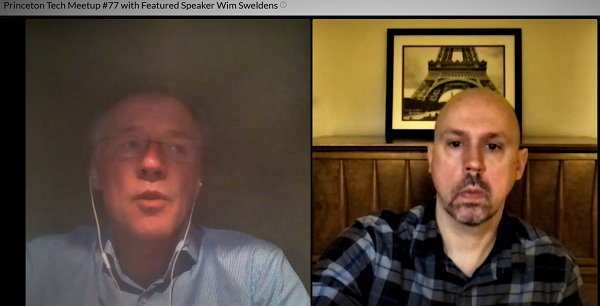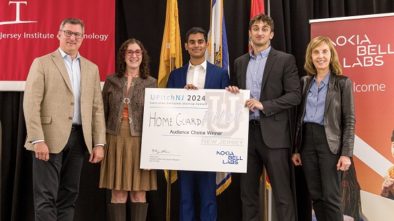Sweldens Talks about Entrepreneurship and Video Innovation at Kiswe during Princeton Tech Meetup
Wim Sweldens, former CEO and one of the founders of Kiswe Mobile (New Providence) discussed entrepreneurship and Kiswe’s journey during an online meeting of the members of the Princeton Tech Meetup.
The May meeting was facilitated by the Princeton Public Library, and moderated by Chris Boraski, a Princeton Tech Meetup organizer who works at Kiswe as a senior IOS development lead.
Sweldens, who is originally from Belgium, came to New Jersey 28 years ago. He worked as a technology researcher and spent some of his career at Bell Labs. After Bell Labs became part of Lucent, and then Alcatel-Lucent, Sweldens had the opportunity to lead a group that was commercializing technology.
“I was leading a small group of renegades. Everyone was not only inventing technologies, but commercializing them, too. It was the most entrepreneurial corner of a traditional big company; and when things failed, nobody was punished.”
Later, Sweldens spent time at Princeton University, helping the university “spit out some new companies,” but at the end of 2013 and beginning of 2014, he and his cofounders, Jeong Kim from Bell Labs and Jimmy Lynn from AOL, started Kiswe. He explained that the name doesn’t mean anything. It’s the combination of the cofounders’ last names.
The company’s website says that venture-backed Kiswe is a cloud-based video company that creates real-time livestreams to engage digital audiences and unique communities around the world. By partnering with sports rights holders, Kiswe’s CloudCast product enables remote commentators to transform live games into multiple viewing experiences via personalized content and local languages. Kiswe’s technology also unlocks ways for people to stay connected over live events through a content-creation and mobile platform that bridges media companies with consumers.
Sweldens’ passion is biking. However, he noted that biking has a negative side, which he knows only too well, as he was involved in a terrifying crash that almost took his life. He said that it took him a year to recover, and he urged bikers out there to wear their helmets.
Aligning Teams
Comparing entrepreneurship to cycling, Sweldens said, “What is important in a team is to align the team to make sure that everybody is going in the same direction.” That means aligning the vision, the mission and the execution. Execution can develop “crows’ feet,” not like the cyclists in team time trials, where particular teams align. They can get 30 percent to 35 percent more acceleration by aligning correctly, he said.
“If you can get to market faster, if you can see trends faster, if you can react to trends faster than your competition, that trumps everything else.”Wim Sweldens, Kiswe
Companies that want to win also need to align their teams to accelerate, Sweldens stated. “People always ask, ‘What is the key differentiator of your product?’ ‘Was it the intellectual property?’ ‘The lists of patents that you have?’ and things like that. And, yes, all these things are important; but, ultimately, what’s more important than anything else is being faster.
“If you can get to market faster, if you can see trends faster, if you can react to trends faster than your competition, that trumps everything else.”
Sweldens noted that the viewing experience in sports is pretty much the same as it always has been despite innovations in digital and mobile. “And that’s why we started the company. With the advent of mobile devices and streaming, there was an opportunity to change that.”
Mobile devices are fundamentally interactive, he noted, and a “broadcast stream or broadcast TV is almost the opposite.” The broadcast experience is the same for all people watching TV. Everyone watches the exact same thing at the exact same time. “If you’re lucky, you might be able to pause and rewind or something like that. That’s the only ability.”
Kiswe and the Beauty of the Cloud
Kiswe uses the cloud to enable personalization and interactive capabilities. He explained that the beauty of the cloud is that the product is scalable. Developers can almost do a “copy and paste” of particular capabilities and spin up instances of launchable virtual machines. It’s much better than on-premises hardware or solutions that are infrastructure driven, he said.
The innovative technology has some unique use cases, as companies are experimenting with it. In one case, Sweldens said, the NBA teamed up with some internet influencers who call NBA games. Using the technology allowed the NBA to unlock a huge audience, he noted. “They do it in a very different way than your traditional TV announcer, who may be doing it for a long time, who might be a little bit more traditional. They are internet influences, and they do it differently. They do it with their own background, they do it with their own style, they do it with the whole picture,” Sweldens said.
Viewers can watch an NBA game the way we would watch Twitch, and that led to the cofounders’ view that they were “really open to something here, and there is a really new way of producing the game. So, so that’s part of the business that we’re working on.” Sweldens added that Kiswe is looking at more sectors of the market where it can expand this model.
After the Princeton Tech Meetup took place, Kiswe announced that it had signed a memorandum of understanding with South Korea’s Big Hit Entertainment that signaled a partnership between the startup and the global entertainment brand.
According to the press release, “The new partnership is set to expand its global business in the pursuit of fan experience innovation. With global fan community platform Weverse at the forefront, Big Hit and Kiswe will bring diverse services and carry out ‘one-stop service in the music industry.’ “Big Hit and Kiswe’s strategic alliance aims to maximize their synergies to deliver music fans around the world a more inclusive and enjoyable concert experience. Kiswe’s technology and Big Hit’s content and artist IP will work together in developing and customizing new services that will enable fans to enjoy content in the most optimal way in the ever-changing concert ecosystem.”




